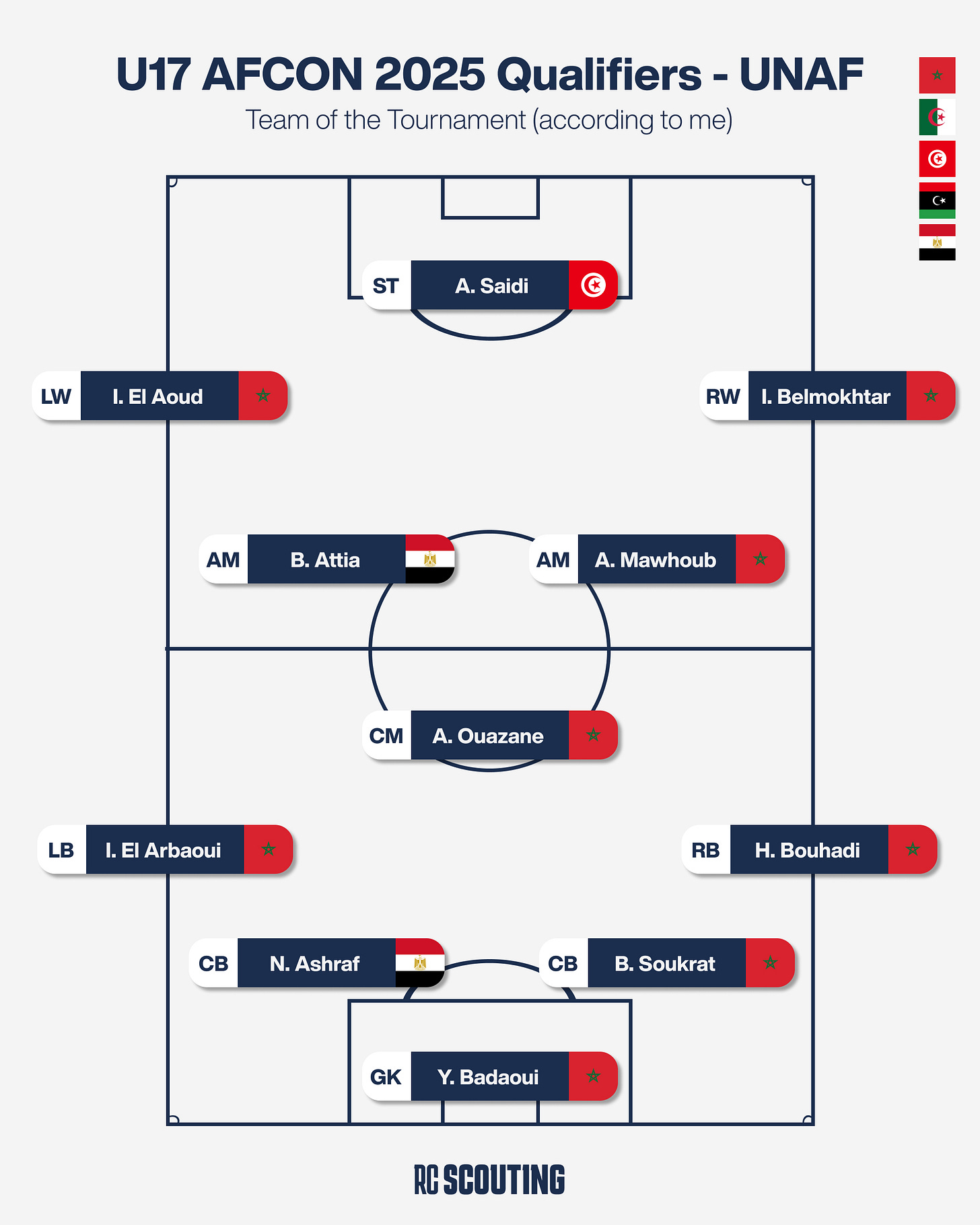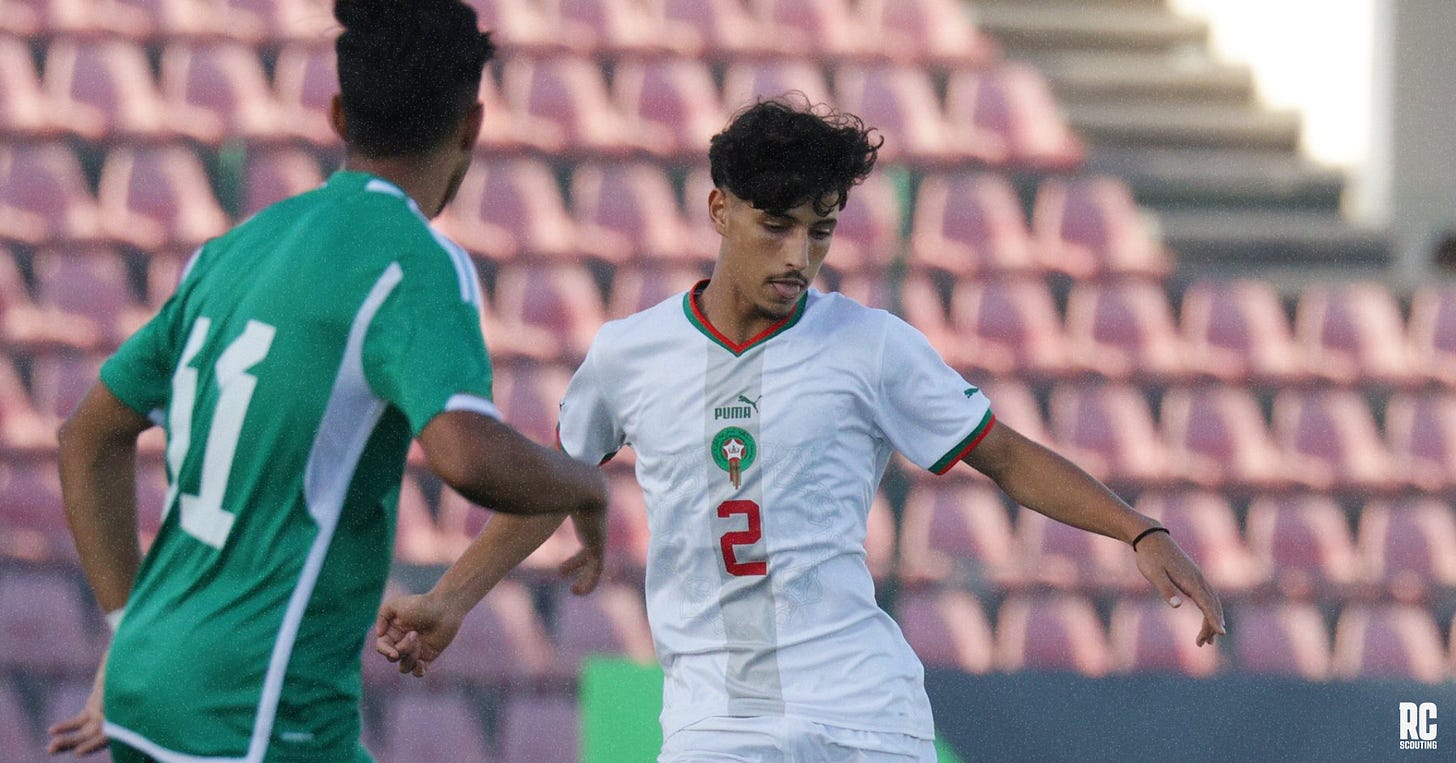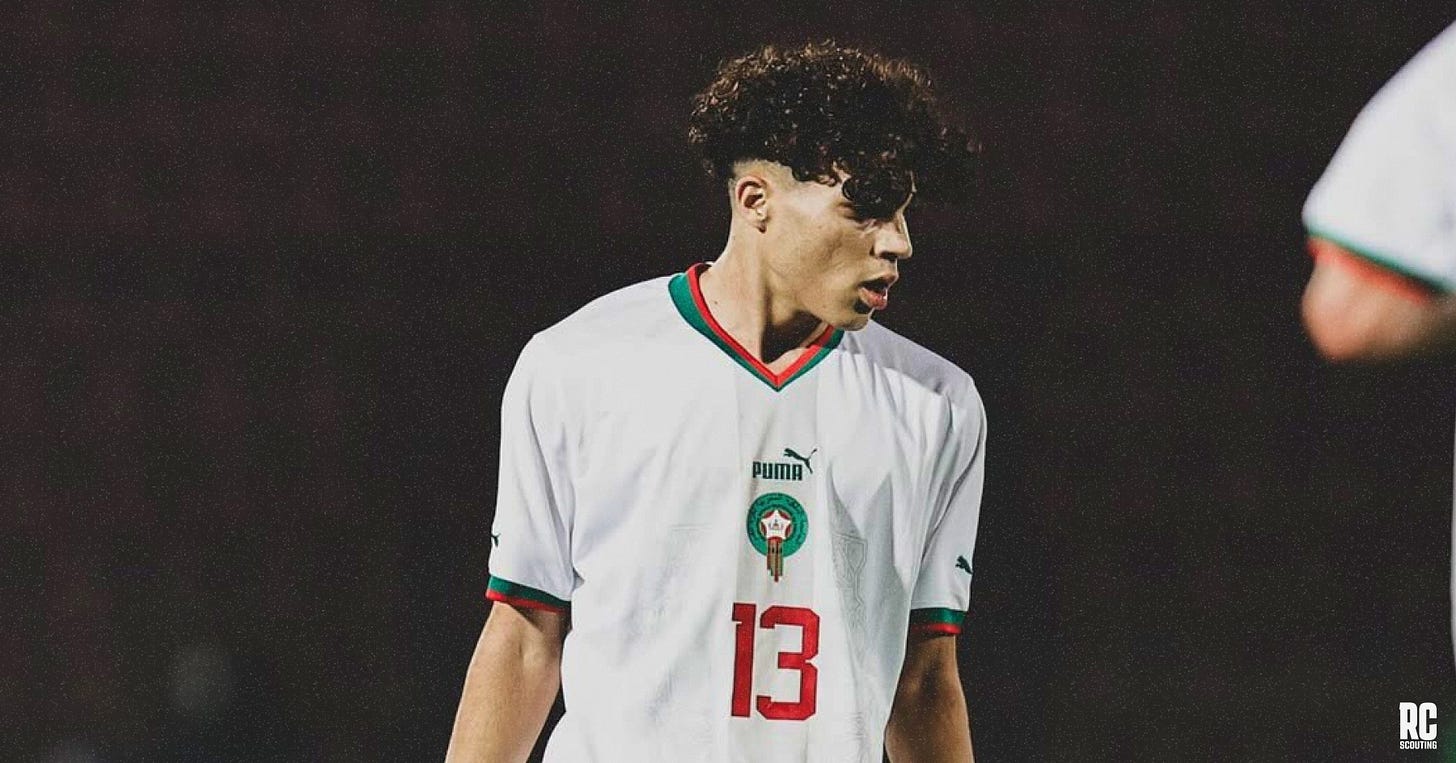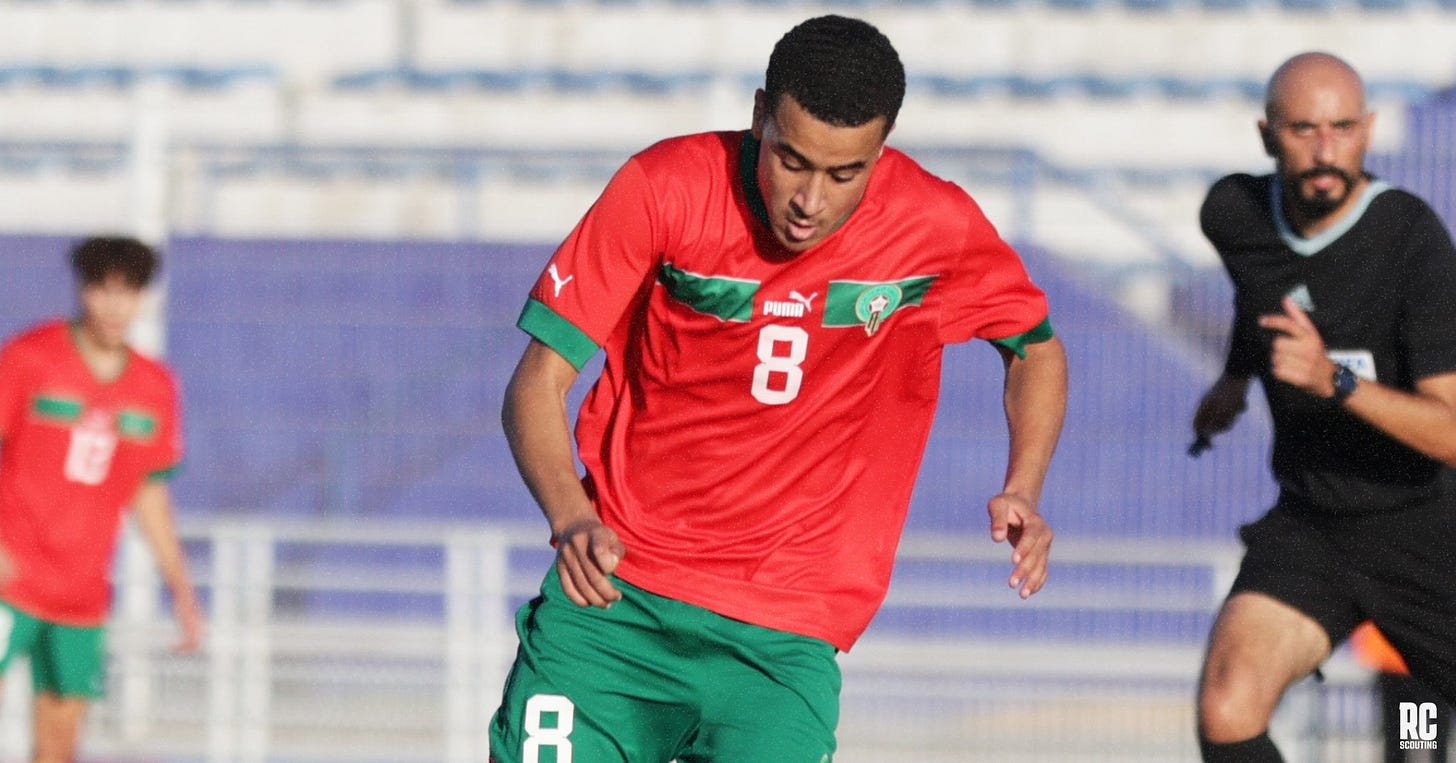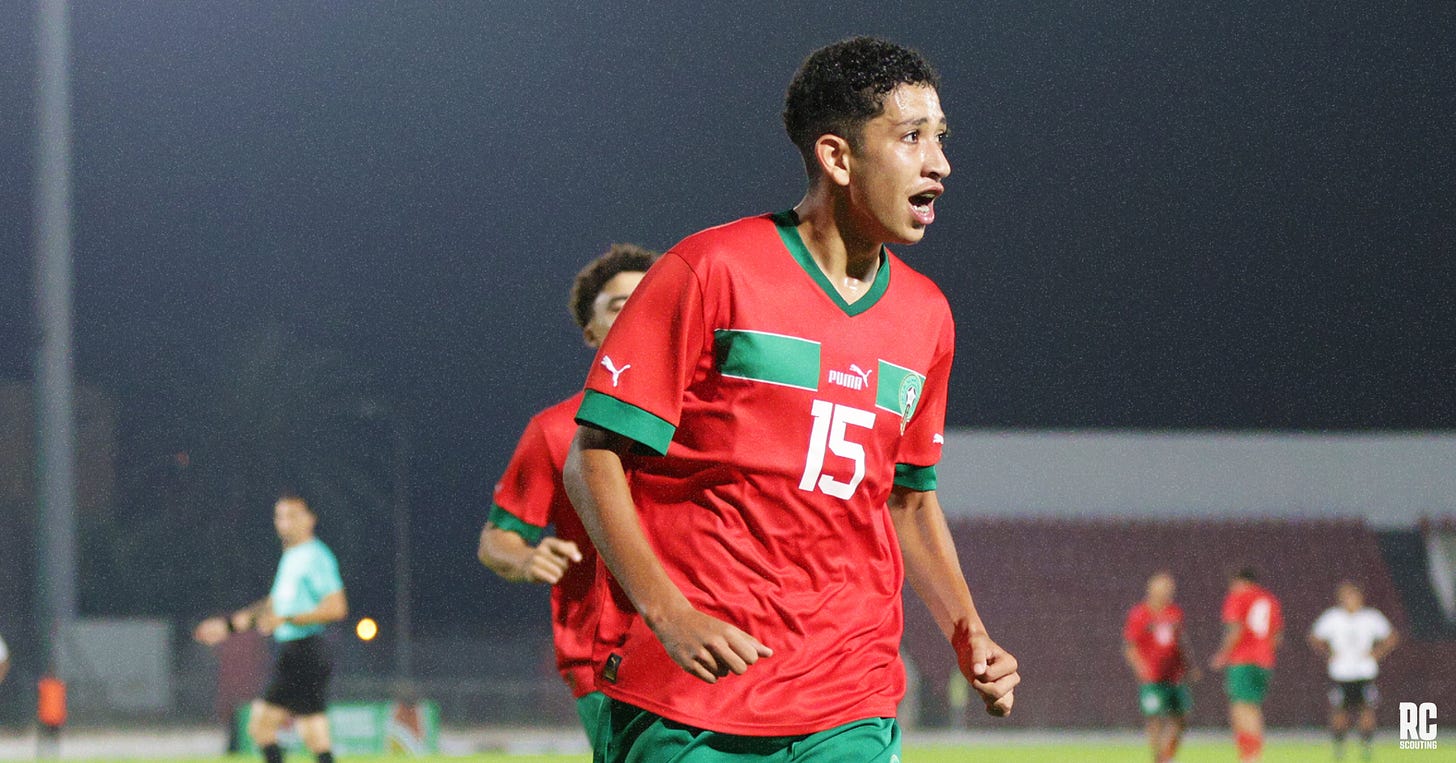My U-17 AFCON UNAF Qualifiers Team of the Tournament
A glimpse at North Africa's next generation through local and diaspora talents.
The U-17 AFCON UNAF Qualifiers Tournament, held in Morocco, ended a month ago, yes sorry I’m late to talk about it, but better late than never, right?
Basically, it serves as the qualification stage for North Africa’s five nations (Morocco, Algeria, Tunisia, Libya and Egypt) vying for a spot at the 2025 U-17 Africa Cup of Nations in Morocco. With only the top two teams securing their places, the stakes were high, and it was Egypt (1st) and Morocco (2nd) who ultimately emerged victorious, clinching their tickets to the continental event. This U-17 AFCON will, in turn, act as a qualifier for the newly expanded 2025 U-17 World Cup to be held in November 2025, which will feature 48 nations, a development I personally can’t wait to see unfold.
But let’s get back to the matter at hand. I had the chance to watch all 10 games and have put together my Team of the Tournament. What’s interesting is the mix of players, a blend of homegrown talent from North Africa’s local academies and those shaped abroad through the diaspora. My Team of the Tournament includes five players trained within the North African region and six who hail from other countries like France, the Netherlands, and even the United States.
Anyway, that’s enough talking, here is my U-17 AFCON 2025 UNAF Qualifiers Team of the Tournament :
GK: Yassine Badaoui (2008 | FC Rouen | 🇲🇦)
This year’s tournament didn’t showcase an exceptional level of goalkeeping overall, but there were still a few notable performances.
I’ve selected Yassine Badaoui, the Moroccan goalkeeper trained in France and featured in every game of the tournament. He was particularly crucial during Morocco’s weaker phases, delivering key saves when his team needed him most. His composure under pressure and sharp reflexes on the line were key attributes that caught my attention. That said, there’s room for improvement in his long distribution, which remains an important area to refine as he continues to develop.
RB: Hamza Bouhadi (2008 | FUS Rabat | 🇲🇦)
Hamza Bouhadi impressed with his relentless work rate and ability to make countless numbers of high-intensity runs, it’s the kind of player that makes you say: “Yeah, this one is ready to die on the pitch for his team”. From the opening whistle to the final minute, he showcased boundless energy, tirelessly covering ground on the right flank to contribute both offensively and defensively. His explosiveness, agility, and stamina allow him to transition seamlessly between phases of play, making him a dynamic presence.
Defensively, he is composed, keeping smart positioning and showing solid judgment in one-on-one situations. In possession, he’s technically sound in tight spaces and combines well with his winger, helping his team progress up the field. However, his delivery from wide areas, especially his crossing in the final third, is an area that could benefit from refinement.
CB: Bilal Soukrat (2008 | RS Berkane | 🇲🇦)
Bilal Soukrat was a cornerstone of the tournament's best defensive unit, his composure and intelligence at the back were crucial. What I appreciated about him was how much he contributed offensively. His ground passing stood out to me as a major asset. Whether it was threading precise balls into his teammates’ feet or finding space to create attacking opportunities, he had a real knack for breaking lines. However, when it came to aerial distribution over medium or long distances, I felt there was room for improvement.
One of the moments that stuck with me was his impact on set pieces. Positioned at the far post, he’s a constant threat. He’s either creating dangerous second-ball situations or, as seen against Algeria, directly making the difference. That header he scored was a perfect example of his value in these situations.
Defensively, he is sharp and reliable. His timing in challenges is spot-on, particularly in those last-man scenarios where any mistake could be costly. I rarely saw him make a poor decision, even under pressure, which speaks volumes about his understanding of the game.
CB: Nour Ashraf (2008 | Enppi SC | 🇪🇬)
For me, Nour Ashraf really embodies the qualities of a modern center-back. One of the first things I noticed about him is his notable precision with long aerial passes, he’s the kind of defender who can consistently find his teammates with ease and really help his team progress the ball up the field. What I particularly appreciated is how he’s not afraid to step into open spaces with the ball at his feet, driving forward confidently before delivering sharp, accurate passes. That mix of verticality, whether it’s through his runs or his passing, is a great valuable trait.
Physically, compared to Bilal Soukrat, he’s clearly more imposing, and it shows in his duels. He doesn’t shy away from using his strength to dominate opponents, and his standing tackles? Spot-on. He’s got this clean, well-timed approach to his interceptions that I really like.
That said, he’s not without his challenges. I did notice that he struggles a bit in 1v1s out wide, especially against those quick, explosive wingers with a sharp burst of pace. He’s not the quickest off the mark, and that’s something he’ll need to work on.
LB: llyas El Arbaoui (2008 | Athletic Bilbao | 🇲🇦)
Left-back was one of the positions where I found the overall quality of the tournament somewhat underwhelming, similar to the goalkeeper spot. However, Ilyas El Arbaoui stood out as a consistent performer across all four matches he played.
With Hamza Bouhadi on the right taking on more offensive duties, Ilyas was tasked with maintaining a more defensive role on his flank. That said, he wasn’t shy about contributing to Morocco’s offensive build-up. He made himself useful during transitional phases, offering high-intensity runs down the left wing. I also noted his ability to switch seamlessly with his winger, frequently overlapping to allow the winger to drift into the half-spaces.
While his role leaned more heavily on defensive stability, his tactical awareness and work rate ensured he could support both ends of the pitch effectively. Though there’s room for improvement in his overall impact, particularly in the attacking third, Ilyas’ solid performances earned him a well-deserved spot in this team.
CM: Abdellah Ouazane (2009 | Ajax Amsterdam | 🇲🇦)
Abdellah Ouazane is one of the youngest players in my Team of the Tournament, born in 2009, yet he’s already showing qualities well beyond his age. In the midfield, he’s what I’d call a true facilitator and accelerator of play. Watching him, it’s hard not to notice how much he simplifies and speeds up Morocco’s transitions.
Technically, he is on another level. His ball control is exceptional, often orienting his touches forward to create immediate advantages. What impressed me even more was his ability to navigate tight spaces. Surrounded by opponents? No problem, his ball-carrying under pressure is a joy to watch, and he consistently finds a way out. He brings verticality both through his dynamic runs with the ball, which he clearly enjoys, and through his passing. Combining his technical skill with creativity, he’s capable of delivering line-breaking passes that leave attackers in 1 on 1 situations with the goalkeeper.
In my opinion, even though he’s already playing in a higher age category, Abdellah has the quality and maturity to take on even greater challenges.
AM: Ahmed Mawhoub (2008 | FUS Rabat | 🇲🇦)
Ahmed Mawhoub is the kind of player I personally enjoy watching, a slender frame, yet incredibly comfortable on the ball. He’s a bit of an unsung hero, the type of player who might not get the spotlight for touching the ball constantly but whose work off the ball is immense.
He excels at pressing high and initiating interceptions in midfield, he’s also constantly moving to offer solutions or create space for his teammates. His work rate is remarkable, and what’s even more impressive is his ability to maintain this intensity throughout the match. Combine that with his quickness and agility both in his runs and his changes of direction and you have a player who adds tremendous energy to his side.
Technically, he boasts an impressive range. His passing is refined, whether it’s to control the tempo from deeper areas or to unlock defenses with precision in the final third. He’s also an excellent dribbler, capable of weaving through tight spaces and breaking lines.
He clearly was a key contributor to Morocco's 2nd place in the tournament, featuring for 356 out of a possible 360 minutes.
AM: Belal Attia (2008 | Al Ahly | 🇪🇬)
Belal Attia really stood out for me during this tournament. In terms of physical presence, compared to Ahmed Mawhoub he’s clearly more robust, especially thanks to his developed quadriceps, which give him an edge in duels. But what’s interesting about him is that he’s not just about strength, he combines it with agility and a good turn of speed.
What impressed me most was his constant movement. He’s always on the move, always looking to make himself available to his teammates. On the left side, he covers so much ground, whether in possession or out of possession. That work rate and energy are a big part of what makes him so effective, especially in transitions.
On the technical side, he’s sharp. His decision-making is quick, and he executes just as fast, which makes him a real threat in the final third. He’s also someone who loves to dribble and has no trouble taking on and beating defenders. Honestly, I’m excited to see him in the upcoming U17 AFCON, because he definitely has the potential to shine on that stage.
RW: Ilies Belmokhtar (2008 | AS Monaco| 🇲🇦)
Ilies Belmokhtar, Morocco's right winger, is a player whose profile I’ve already detailed in a previous article, and in this tournament, he once again showed exactly what makes him special. True to his style, he was decisive from the start. In the opening match against Egypt, he came on for just 17 minutes and immediately scored a goal. In the following game against Tunisia, with the score tied at 2-2, he delivered both assists that made the difference.
He is a highly technical player who thrives on dribbling and creating opportunities through his vision and passing. He’s a key asset in the final third, capable of unlocking defenses and generating chances for his teammates. However, throughout this tournament, I couldn’t help but notice a certain nonchalance in his approach at times, which slightly detracted from his overall performance.
LW: Ismail El Aoud (2009 | Valencia CF| 🇲🇦)
Ismail El Aoud, Morocco’s left winger, was my pick for this position, though Mohamed Hamad from Egypt’s team could have easily taken the spot as well. What tilted the scales for me is that Ismail, born in 2009, is younger by at least six months, an important detail at this level.
Ismail is a physically powerful player with an explosive burst and impressive sharpness, particularly in his high-intensity runs, which he can repeat frequently throughout a match. He’s a key figure in fast transitions to the final third, where his pace and explosiveness stand out. A good dribbler, he enjoys taking on his marker and driving into the box, creating moments of danger.
That said, his decision-making near the box remains an area for improvement. Too often, he favors individual actions when better options are available, leading to turnovers. With better awareness and a more refined decision-making process, he could take his game to the next level.
ST: Anisse Saidi (2008 | Philadephia Union | 🇹🇳)
The lone representative of the Tunisian team in my Team of the Tournament is their striker, Anisse Saidi, who finished with an impressive tally of 4 goals, 1 against Algeria, 1 against Libya, and a brace against Egypt.
For his age, he possesses a remarkably complete striker profile, which he showcased brilliantly throughout the tournament. Tall, powerful, and surprisingly mobile, he combines physical presence with technical finesse. His ability to shoot quickly after a controlled touch is particularly impressive, as is his finishing, powerful and precise, even in the air, as seen with his header against Algeria.
Beyond his goal-scoring abilities, Anisse excels in duels with his back to goal. He often drops deeper to offer passing options and shows great composure in holding off defenders with the ball at his feet. Once in control, he’s capable of turning efficiently to carry the ball forward or play quick vertical passes to his teammates. A dynamic and intelligent forward, he’s certainly one to follow closely in the years to come.
Thank you for reading until the end, I will certainly do an update article on these players during the U-17 AFCON, so subscribe to not miss it!





